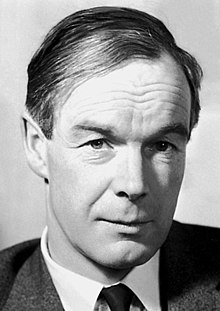Alan Hodgkin
Sir Alan Hodgkin | |
|---|---|
 | |
| Born | 5 February 1914 Banbury, England, UK |
| Died | 20 December 1998 (aged 84) Cambridge, England, UK |
| Nationality | English |
| Citizenship | British |
| Alma mater | Trinity College, Cambridge |
| Spouse | Marion Rous |
| Children | Sarah, Deborah, Jonathan, and Rachel |
| Awards | Royal Medal (1958) Nobel Prize in Physiology or Medicine (1963) Copley Medal (1965) |
| Scientific career | |
| Fields | Physiology and Biophysics |
Sir Alan Hodgkin, OM, KBE, PRS (Alan Lloyd Hodgkin, 5 February 1914 – 20 December 1998) was an English physiologist and biophysicist.[1] He shared the 1963 Nobel Prize in Physiology or Medicine with Andrew Huxley and John Eccles.
Alan Hodgkin, Andrew Huxley, and John Eccles (for his research on synapses) were jointly awarded the 1963 Nobel Prize in Physiology or Medicine "for their discoveries concerning the ionic mechanisms involved in excitation and inhibition in the peripheral and central portions of the nerve cell membrane".[2] In addition Hodgkin and Huxley's findings led them to suggest the existence of ion channels in cell membranes, which was confirmed decades later.
Hodgkin was knighted (KBE) in 1972 and appointed to the Order of Merit in 1973. From 1970 to 1975 he was President of the Royal Society.
References
[change | change source]- ↑ Huxley, S. A. (2000). "Sir Alan Lloyd Hodgkin, O.M., K.B.E. 5 February 1914 -- 20 December 1998: Elected F.R.S. 1948". Biographical Memoirs of Fellows of the Royal Society. 46: 219–241. doi:10.1098/rsbm.1999.0081. S2CID 72238119.
- ↑ "The Nobel Prize in Physiology or Medicine 1963". Nobelprize.org. Nobel Media AB. Retrieved 16 June 2014.
